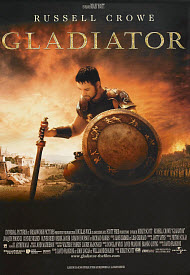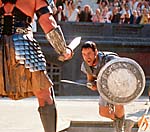Gladiator
 for intense graphic combat.
for intense graphic combat.
Reviewed by: Emmett W. Elliott
CONTRIBUTOR
| Moral Rating: | Very Offensive |
| Moviemaking Quality: |
|
| Primary Audience: | Adult |
| Genre: | Action Adventure |
| Length: | 2 hr. 35 min. |
| Year of Release: | 2000 |
| USA Release: |
May 5, 2000 (wide) |
| Featuring |
|---|
|
Russell Crowe … Maximus Joaquin Phoenix … Commodus Connie Nielsen … Lucilla Oliver Reed … Proximo Richard Harris … Marcus Aurelius Derek Jacobi … Gracchus Djimon Hounsou … Juba See all » |
| Director |
|
Ridley Scott |
| Producer |
|
DreamWorks SKG Universal Pictures Scott Free Productions See all » |
| Distributor |
Sequel: “Gladiator II” (2024)
Director Ridley Scott, who also directed the sci-fi cult movies “Alien” and “Blade Runner”, does not resort to sexual titillation in “Gladiator”. The film only hints that deviant sexual behavior may have taken place when Lucilla (Connie Nelson) must endure the incestuous advances of her own brother Commodus (Joaquin Phoenix). Instead of the usual Hollywood dosage of bare skin on screen, Scott exploits violence. In short, “Gladiator” is a gory computer-generated special effects blockbuster.
“Gladiator” begins in 180 A.D. with General Maximus (Russell Crowe) about to vanquish the last threatening barbaric horde. Scott engages the moviegoer with a grand opening battle scene reminiscent of “Saving Private Ryan.” The ensuing bloodbath contains close-ups of clashing metal, blood, beheadings, and dismembered body parts much like sequences seen in “Braveheart.”
The hero of the movie, Maximus, is comparable to William Wallace who announced in “Braveheart”, “I came home to raise crops, and God willing, a family. If I can live in peace, I will.” Likewise, General Maximus yearns to return to his Spanish farmland and reunite with his wife and son; however, the Emperor Marcus Aurelius (Richard Harris) has another plan for his beloved general.
Jealousy overpowers the morally flawed Commodus when he discovers that his father, ruling the empire as an expansionist dictator, favors Maximus to protect Rome until the Senate assumes enough power for Rome to govern as a Republic once again. Reminiscent of the first murder ever recorded, a jealous Cain slew Abel in Genesis 4:8, Commodus asphyxiates his father to become the new emperor. Subsequently, Emperor Commodus orders the execution of Maximus and his family.
Unbeknownst to Commodus, Maximus survives his execution only to be enslaved by his saviors. He is purchased as a slave by Proximo (Oliver Reed) and forced to entertain the people (“the mob”) as a deadly gladiator. Maximus unites with Juba (Djimon Hounsou) and Hagen (former Mr. Universe Ralph Moeller) as fellow gladiators. Maximus quickly displays his superior skills as a warrior to emerge as a champion among the gladiators. The mob coins him “The Spaniard” and at times is even silenced by his unique talent as a killer of men.
Meanwhile in Rome, Commodus refuses to listen to the advice from the Senate. Instead of dealing with important domestic issues, Commodus chooses to focus his visionless political agenda on maintaining happiness among the mob by reopening the barbaric gladiator games in the spectacular Roman Coliseum. To Commodus, it does not matter how he governs as long as his poll ratings are high as best sampled during the games. This governing policy lasts until Proximo brings his band of gladiators to Rome where Maximus quickly wins the crowd over. To make matters increasingly difficult for the emperor, Maximus openly defies the emperor after each victory. Once again, fancy abandons Commodus for Maximus. The plot thickens leading to the eventual main event between the jealous Commodus and the mob’s newfound hero, Maximus.
Unfortunately, Scott was careful enough to censor any mention of Christianity (at least the theater/video version… the DVD release reportedly does have a powerful and prayerful scene where Maximus watches as Christians are fed to the lions). Maximus hopes to reunite with his family in the afterlife, but what kind of afterlife? In a time when Christianity was sweeping across Rome, I wished that our gladiator had been a converted, reborn Christian.
The performances are uniformly good, but most moviegoers will select this film for the action sequences and special effects seen briefly in the trailers. The computer-generated graphics enhance the action sequences and recreate a glorious Roman world albeit void of Christianity. Due to this major oversight, “Gladiator” falls short of classic and offers new meaning to the movie’s tagline: “A hero will rise.”


The acting was top notch. Several English character actors (Harris, Jacobi, Reed) bolstered the excellent casting of Russell Crowe as Maximus.
The down side is both the content and the message sent by the film. If you take it in historical context, it is outwardly harmless. (If you don’t think the violence will scar you.) Also, paganism is quite rampant in the film. Once again, if taken in context, it is harmless. Bottom line: Don’t take children or young adults with underdeveloped minds to see this movie. [2½/4½]
This disturbing reality so intrigued me that I could not help noticing similarities between the Colosseum and Hollywood itself: two dynamic monstrosities which both feed and are fed by their audiences’ bottomless appetites.
Technically, “Gladiator” is a wonder to behold. Frenetic camera work and editing emphasize the surreal—though blistering—pace of battle. Strange filters and time-lapse photography during Maximus’ afterlife-reveries are fantastic and recall similar practice in Joan of Arc’s visions in Luc Besson’s “The Messenger” and even in the whole unreal experience of David O. Russell’s “Three Kings.”
The use of computer-generated imaging is truly spectacular (and almost flawless) and this kind of movie couldn’t have been accomplished without it. The acting comes in fine form (Crowe stands out especially) and the story itself (though a historical mockery) is taut and keeps a largely rapt audience for the duration… [3/4½]
I just have to put in a historical footnote. The guest reviewer for Gladiator was disappointed that there was not a mention of Christianity within the film. There is a reason for this: Christianity did not become legal until Emperor Constantine. The movie is set before this, and although Christianity was spreading (mostly among Greece, southern Italy, parts of the Middle East), it was not popular with the soldiers (under penalty), especially because Christianity had not yet made it to Spain for Maximus. The reason it was not in the movie is because it was not an issue among the characters of the story (which I guess is bad from a Christian perspective). [3/5]
This movie is a little like “Ben-Hur” meets “Braveheart,” without any of the Christian elements, which is the consistent pattern we see in most movies today—Heaven forbid if we so much as introduce Jesus or Christianity into the picture.
This is definitely not a movie for children. I was appalled to see a mother bring her young son [maybe 5 years old] into the theater. Hollywood’s rating system, however flawed it may be, is still there as a guideline [which I consistently see being ignored by parents who bring young children to PG 13 and R rated movies]. [3/4]
“Gladiator” isn’t a Christian film per say. But it does clearly separate good from evil which is refreshing in a desensitized movie industry. The main character is a hero; the enemy a true tyrant. “Gladiator” builds into an action suspense epic in the midst of stunning battles, landscapes and venues. This is best picture material. Even if one needs to close the ole eyes during the copious violence in the battle and gladiator scenes, the rest of the movie would still be worth it. A must see on the big screen! [2/5]
I think it is a big mistake to assume that everything in historical films needs to revolve around where Christianity was at the time. That was more than likely the reason Ridley Scott chose to downplay the religious beliefs of the characters. Maximus does confirm that he believes in a God, not one in particular. And with many of the Empire’s most powerful hailing Caesar as the only God, spiritual ambiguity was probably the best decision… Ridley Scott finally has his long-overdue masterpiece. [2½/5]





Also, I have noticed several commentators wanted Christianity to be more prominent. Frankly, this would only add to any historical inaccuracies in “Gladiator”. Christianity had begun its rise in the late second century, but was by no means prevalent in Italy (N. Africa and Asia were its strongholds at this time).
Secondly, Early Christians did not believe in killing in any form—including serving in the military. The Early Christians condemned the gladiatorial games and military service and would not have been above disciplining those who involved themselves in these activities out of spiritual weakness. For a further understanding of Christian views on war/killing in the Early Church, I recommend one read translations of the Church Fathers. One valuable, brief synthesis of the material is “Early Christians Speak” by Everett Ferguson.
I recommend “Gladiator”—it gives one a richer perspective on the Roman Empire and its mindset. This can only help Christians when reading their New Testaments. My Ratings: [2½/5]